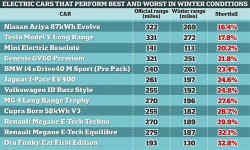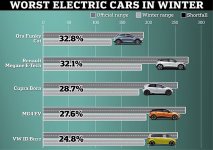teamzr1
Supporting vendor
If you're thinking about buying an electric car, you need to know that they do not like Britain's icy winters and will not perform to the levels quoted by their manufacturers.
That's according to a new study published at a time when parts of the UK is experiencing plummeting temperatures and snowfall.
It found real-world ranges of popular electric vehicles (EVs) can fall by almost a third when it's particularly cold outside.
A review of 12 of the nation's best-selling battery-powered cars found that the worst was 32.8 per cent down on its claimed driving range on a full charge.
The least impressive performer among the selection of EVs was China's new Ora Funky Cat, which starts from £31,995 in the UK.


That's according to a new study published at a time when parts of the UK is experiencing plummeting temperatures and snowfall.
It found real-world ranges of popular electric vehicles (EVs) can fall by almost a third when it's particularly cold outside.
A review of 12 of the nation's best-selling battery-powered cars found that the worst was 32.8 per cent down on its claimed driving range on a full charge.
The least impressive performer among the selection of EVs was China's new Ora Funky Cat, which starts from £31,995 in the UK.


